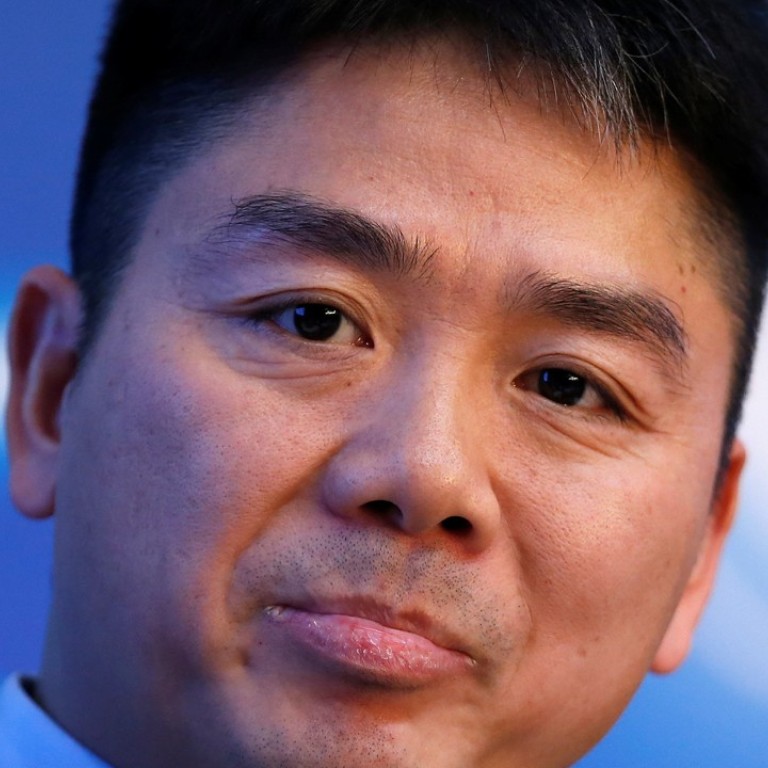
Experts say corporate governance risks exposed at JD.com after CEO Liu’s arrest on rape allegation
Expert says that JD.com has an unusual set of corporate rules
The control exerted by founder Richard Liu Qiangdong over China’s second largest e-commerce player JD.com has been thrown into sharp relief by his recent US arrest on a rape allegation, exposing corporate governance risks at the Beijing-based company, analysts say.
Liu, the billionaire chief executive of JD.com and one of the company's five board directors, was arrested in the US on August 31 after being accused of rape before being released and returning to China.
Although he was back at work in Beijing on September 4, Liu's brief detention has raised questions over whether the company can function effectively without him.
Liu receives almost all of his compensation in the form of equity – he has a stake of 16 per cent in Nasdaq-traded JD.com stock, but controls 80 per cent of the voting rights.
According to the company’s official by-laws, “Mr. Liu has considerable influence over matters such as electing directors and approving material mergers, acquisitions or other business combination transactions".
Moreover, under the current rules of JD.com, “the board of directors will not be able to form a quorum without Mr. Liu for so long as Mr. Liu remains a director".
JD.com’s corporate by-laws state that all board meetings must include Liu unless he is “permanently unable to attend board meetings and manage the business affairs of the Company as a result of incapacity solely due to his physical and/or mental condition (which, for avoidance of doubt, does not include any confinement against his will)".
Experts say this puts JD.com’s operational stability at risk.
“If it is correct that ‘confinement against his will’ is insufficient reason for JD.com to hold a board meeting without Liu, then the possible imprisonment of Liu essentially renders JD.com powerless,” said Paul Haswell, a partner at international law firm Pinsent Masons.
“In a situation such as this, one would expect Liu to appoint a proxy to attend board meetings on his behalf … if he doesn’t then it’s difficult to see how JD.com can continue to operate effectively when the board is prevented from meeting and making decisions.”
Although many of China’s biggest tech firms tend to be headed by powerful leaders, running elevated levels of “key man risk” in general compared with international peers, JD.com has a very unusual set of rules, according to industry experts.
Arrest details revealed: JD.com boss Liu was accused of first-degree rape
In a separate development on Monday, Jack Ma Yun announced he would be handing over the reins as executive chairman of Alibaba Group Holding to current chief executive Daniel Zhang Yong at the end of a year-long period to ensure a “smooth and successful” transition.
Zhang will be promoted to executive chairman on September 10 next year, while Ma will remain a director on Alibaba’s board and a permanent member of the Alibaba Partnership.
In a letter to customers, employees and shareholders, Ma said that China’s biggest e-commerce company had been working for 10 years on a system of governance “to develop consistent talent and successors” and that “no company can rely solely on its founders”. New York-listed Alibaba is the parent company of the South China Morning Post.
“JD.com’s set of rules gives its founder Liu almost unfettered control over the company. It's certainly very uncommon to have a clause like this,” said David Smith, head of corporate governance, Asia-Pacific, at Aberdeen Standard Investments. “The key-man risk is compounded by the highly unusual by-laws at JD.com.”
In an update posted on JD.com’s corporate blog last week, the company said “Liu is willing to cooperate further if requested” with Minneapolis law enforcement. No charges have been filed against Liu and the matter is still under investigation.
“If Liu does not go to the US to face possible charges – if called – then the US may request his extradition,” said Pinsent Masons' Haswell. “However, given the relationship between the US and China at present, we would have to see if such a request is honoured.”
JD.com did not reply immediately to a request for comment on whether it was able to hold board meetings in Liu’s absence.
Liu himself has yet to make a personal statement regarding the events of August 31.
Liu was in Minneapolis to take classes at the University of Minnesota, where he was enrolled at the Carlson School of Management to complete the American residency of a US-China business administration doctorate programme.

